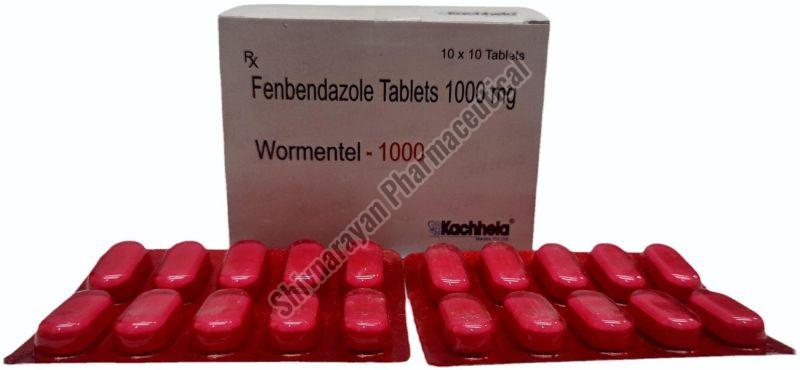fenbendazole capsules: Emerging Studies and New Uses
Recognizing the Benefits and Uses of Fenbendazole in Veterinary Medication
Fenbendazole has actually developed itself as a vital anthelmintic in veterinary medication. Its capacity to target various parasitical infections makes it a useful tool for vets. The drug's device interferes with essential cellular processes in bloodsuckers, causing efficient treatment outcomes. Its safety profile varies between species, requiring careful consideration in its use (fenbendazole 444). Recognizing these dynamics can clarify fenbendazole's broader ramifications in vet treatment and recurring research study right into its prospective beyond conventional applications
System of Action of Fenbendazole

Typical Parasitic Infections Treated With Fenbendazole
A selection of parasitical infections are effectively treated with fenbendazole, making it a versatile alternative in vet medicine. This anthelmintic representative is specifically efficient versus nematodes, including roundworms and hookworms, which generally impact pets and felines. It is additionally made use of for the treatment of cestodes, such as tapeworms, giving a broad range of action against both kinds of digestive tract parasites. Furthermore, fenbendazole is beneficial in taking care of infections created by protozoa, especially Giardia, which can result in gastrointestinal distress in animals. Its effectiveness expands to treating certain lungworms in canines and felines, dealing with respiratory wellness problems connected to these parasites. Generally, fenbendazole's capability to target numerous parasitical types makes it a useful tool in veterinary technique, making sure the wellness and wellness of animals influenced by these typical infections.
Security and Efficiency in Various Pet Species
The security and effectiveness of fenbendazole vary among different pet types, emphasizing the relevance of species-specific factors to consider in vet medicine. In dogs, fenbendazole is typically well-tolerated and reliable versus a variety of stomach bloodsuckers, consisting of roundworms and hookworms. For felines, nonetheless, its use is less common and may need careful application due to potential adverse reactions.
In livestock, such as livestock and sheep, fenbendazole shows effectiveness versus numerous endoparasites, adding to boosted health and productivity. The pharmacokinetics and prospective side impacts can differ markedly in between species, demanding cautious assessment by vets.
Horses also respond favorably to fenbendazole, specifically for dealing with strongyles and ascarids, though dosage and management paths have to be tailored to their unique physiology. Understanding these differences is important for maximizing treatment results and ensuring animal well-being throughout varied species.
Administration and Dose Standards
Correct management and dosage guidelines are essential for taking full advantage of the restorative impacts of fenbendazole while decreasing possible side results. The dosage typically varies relying on the types being dealt with, the details condition, and the formulation of fenbendazole made use of. fenbendazole capsules. For dogs and pet cats, an usual dosage is 50 mg/kg body weight, administered as soon as daily for three consecutive days, yet vets may readjust this based on individual health analyses
It is essential to administer fenbendazole with food to enhance absorption and decrease gastrointestinal upset. The medication is readily available in numerous types, including granules and paste, enabling for versatile administration choices. Monitoring the animal's reaction during and after treatment is a good idea to verify efficacy and safety. In addition, vet assistance is essential to identify the suitable period of treatment based on the kind of parasitical infection being resolved, ensuring suitable end results for the animal's health.
Future Perspectives and Study on Fenbendazole
Research study on fenbendazole remains to advance, concentrating on its prospective applications beyond conventional antiparasitic uses. Current studies have discovered its performance in dealing with numerous forms of cancer cells, particularly in veterinary oncology. Initial information recommend that fenbendazole may hinder the growth of tumor cells and improve the effects of various other chemotherapeutic agents.
Additionally, scientists are examining its duty in handling intestinal problems in animals, highlighting its anti-inflammatory buildings. The versatility of fenbendazole for various varieties questions concerning its security accounts and optimal application regimens in varied populations.
As rate of interest expands, there is a need for detailed medical tests to establish evidence-based standards for these novel applications. Future research might imp source additionally explore the devices behind fenbendazole's effects, possibly paving the means for cutting-edge healing methods in vet medicine. The recurring expedition of fenbendazole can greatly improve treatment choices for numerous vet problems.

Often Asked Inquiries
Is Fenbendazole Safe for Pregnant Animals?
The safety and security of fenbendazole for expectant animals remains unclear. While some researches suggest very little danger, veterinarians normally recommend caution and frequently discourage its usage throughout maternity unless the advantages plainly exceed prospective dangers.
Can Fenbendazole Be Used in Livestock?
Fenbendazole is typically utilized in animals to treat various parasitic infections. fenbendazole. Its effectiveness against stomach worms makes it a beneficial anthelmintic, adding to boosted wellness and performance in animals raised for food and fiber
What Are the Adverse Effects of Fenbendazole?

The negative effects of fenbendazole may consist of intestinal disturbances, sleepiness, and check my blog allergies. In uncommon situations, much more extreme responses could occur, demanding cautious monitoring and consultation with a vet during treatment.
Just How Does Fenbendazole Compare to Various Other Dewormers?
Fenbendazole uses broad-spectrum efficacy against different parasites, typically comparing favorably to other dewormers. Its read the full info here one-of-a-kind mechanism targets different life stages, making it reliable, while typically offering a desirable safety and security account contrasted to alternatives offered on the market.
Can Fenbendazole Be Made Use Of for Dealing With Cancer in Pets?
The potential of fenbendazole in treating cancer cells in family pets has amassed interest. Preliminary research studies recommend it might inhibit cancer cell growth, but better research is essential to validate its efficacy and security in vet oncology.